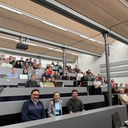This year, the students of the University of Liechtenstein had the task of developing possible strategies for the hotel that could be realised on both a short and long-term basis. These strategies have two objectives: greater visibility for customers and increased attractiveness for potential investors. For the project, the students were divided into two virtual, self-organised consulting companies. While competing with each other as regards their ideas, they nevertheless jointly pursued the same objective in order to provide optimum support for the hotel.
On the last day of their stay, the students presented their results to the management of the hotel. Ruth Altermatt and Cornelia Wiedmer from the SHIMA-Davos were delighted with the results: “The project teams have succeeded in identifying new business ideas and highlighting important solutions together with recommendations on how to implement them. As the management of the hotel, we will immediately include these in our future positioning in the market. We were especially impressed by the international nature of the student group – made up of 16 different nations!”
From the point of view of the University of Liechtenstein, the objective was to use this virtual company to make the students aware of the challenges of their future management responsibility. Hagen Pöhnert, lecturer at the University of Liechtenstein and director of SH Power in Schaffhausen, led this extraordinary project within university education for the ninth time together with the American psychologist Dr Edward Weiss. He enthused: “We let the students experience responsibility ‘live’. The ‘companies’ had to be organised within a very short space of time, and the necessary management structures had to be created and results compiled. This also means 12-hour days involving quick decisions, but also conflict situations – which are sometimes deliberately provoked by ourselves. When they achieve the project goal, the students experience the great feeling of having mutually built a successful team. The leadership tools acquired will provide valuable support in the future careers of these young people.”









